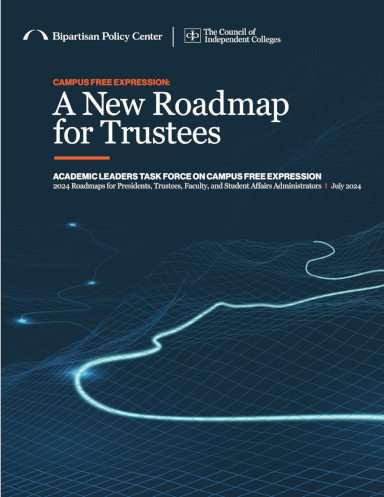Two core principles of higher education—academic freedom and free expression—are under great stress. Sometimes, the stress is direct: Guest speakers are silenced by the heckler’s veto. Government actors overreach in their legitimate oversight role to prescribe or proscribe subjects and scholarly approaches and by suggesting that the mere discussion of divisive concepts could result in sanctions. Well-intended attempts to bolster diversity and inclusion sometimes link hiring, tenure, and promotion to affirming disputed views about equality and how to advance it. Sometimes the stress is indirect, a matter of culture. A faculty member drafting a syllabus decides it is too risky to assign a classic but controversial text. Students hold back from making an argument in class for fear of being ostracized.
More broadly, faculty, student, and staff speech are constrained in a polarized national political environment, in which social media is a megaphone that amplifies campus controversies. Evidence is ample that the intellectual climate on many college campuses impairs discussion of matters about which Americans passionately disagree. The traditional understanding of free speech as a liberalizing force is itself being called into question. Some institutions have responded to these pressures with determined efforts to uphold free expression and academic freedom and to teach these principles to a new generation, but more must be done across the higher education sector.
The chilling of campus speech has effects beyond the borders of the campus. Rather than alleviating the political polarization in our nation today, the inhibition of campus speech is degrading the civic mission of higher education. To maintain our pluralistic democracy, colleges and universities must prepare students for civic participation as independent thinkers who can tolerate contrary viewpoints and work constructively with those with whom they have principled disagreements.
As fiduciaries who wield, in principle, ultimate authority at their colleges and universities, trustees are uniquely responsible for and capable of defending academic freedom and freedom of expression. On campus only a few days annually, trustees delegate much of their power and are loath to intervene in ordinary academic governance. But the same “outsider” status that encourages restraint confers on trustees an ability to notice when policies might be failing and commitment to free expression principles could be waning. Trustees are therefore well situated to defend the principles of academic freedom and free expression to political actors, donors, and outside critics, and to remind colleges and universities that free expression principles are central to their academic and civic missions.
To most help their institutions, trustees must go beyond occasional crisis management and work consistently to support a culture of academic freedom and free expression. The character and means of maintaining such a culture will vary according to the missions and histories of different campus communities. Each governing board must reflect on and affirm academic freedom and free expression.
Governing boards need to take on four challenges:
- In considering high-level institutional goals, trustees must acknowledge the potential tension between upholding free expression and maintaining an inclusive and respectful learning environment for all. Few who have observed higher education in the recent past can fail to notice that permissible speech can cause people to feel hurt or excluded from the collegiate community. Although some expression may be hurtful, freedom of expression remains an essential condition of the genuine inclusiveness that characterizes communities of teachers and learners. It also remains essential to higher education’s academic and civic missions.
- Trustees should champion a diversity of viewpoints on campus. Introducing students to a wide range of perspectives, while giving them the tools to listen carefully and to distinguish between stronger and weaker arguments, is at the heart of teaching. It is also essential preparation for the rigors of citizenship in a diverse society. Although trustees do not typically work directly with students, they can hold others accountable for making viewpoint diversity an institutional priority and can demonstrate their support for it in their own speech and practices.
- Trustees should support strong policies for the protection of academic freedom and free expression for students and faculty and the consistent application of these policies to unorthodox and unconventional views, including those disfavored by most community members. Such policies should include an orientation for students, faculty, staff, and the trustees themselves on the meaning and significance of free expression and academic freedom.
- Trustees should support institutional efforts to make the skills and dispositions necessary for academic and civic discourse a central aim of the collegiate experience. Absent such skills and dispositions, formal protections for free expression and academic freedom, though necessary, are insufficient to create a culture of open inquiry, and respectful, productive debate on campus and in our country. Matriculating students typically need coaching and instruction in these skills and dispositions, for want of which our national discourse suffers. Colleges should strive to graduate students who raise the bar for serious discourse. At the same time, the culture of academic freedom and free expression is not just for students; trustees should consider how they observe these principles in their dealings with each other, as well as with students, faculty, staff, and the senior leadership team.
Trustees face considerable challenges in preserving free expression and academic freedom. Although no college’s board is responsible for curing the ills of higher education nationally, this moment presents significant opportunities for trustees to make a positive impact at their institutions.
In this guide, we first examine the role of trustees and explain the nature and importance of the twin values of free expression and academic freedom. Next, we survey some important changes in our social, political, and campus landscapes. Finally, we present a roadmap with recommendations for trustees seeking to invigorate a culture of robust yet respectful inquiry on their campuses.



